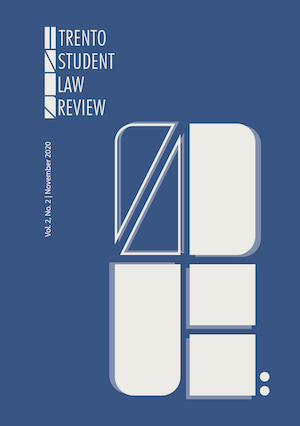Modern Challenges in International Law and Indigenous Rights: The United Nations Declaration on the Rights of Indigenous Peoples, Indigenous Women's Activism, and the Issue of Violence Against Indigenous Women
DOI:
https://doi.org/10.15168/tslr.v2i2.721Parole chiave:
International Law, International Human Rights, Indigenous Rights, Feminist International Politics, Violence Against Indigenous Women.Abstract
Historically, Indigenous women have been the target of violence at an alarming rate compared to the non-Indigenous population. This work explores how Indigenous women have used the United Nations Declaration on the Rights of Indigenous Peoples (UNDRIP) to call for the end of this abuse. The United States and Canada are two North American Federal governments with a strong presence of Indigenous Peoples. Even though Canada and the United States have signed UNDRIP, in North America as many as four in five Indigenous women experience violence in their lifetime. This work looks at how and why there is still such a significant rate of violence against Indigenous women in the U.S. and Canada. In addition, this article surveys the current extent of Indigenous women's participation in the policymaking process. It then explores what changes in law and policy should flow from Indigenous women's activism and in what ways Indigenous women can and should become more involved in the decision-making process. This work also aims to reflect on how the law and policies in the U.S., in Canada and at an international level could more efficiently address the issue. Indigenous women have historically been absent from the decision-making process and even when they are given a voice and their rights are emphasized, for instance with UNDRIP, countries are not complying with their responsibilities on the matter. Consequently, Indigenous women are de facto denied the possibility to participate in the debate, and their claims are left unheard. This article concludes that they should be empowered to advocate for enhanced accountability of the individual countries and the international community alike. In fact, increased participation of Indigenous women in the decision-making process increases the opportunity for Indigenous voices to be heard, in a quest to fight the widespread issue of violence against Indigenous women.
##submission.downloads##
Pubblicato
Come citare
Fascicolo
Sezione
Licenza
Il diritto d'autore sui testi pubblicati nella Trento Student Law Review resta in capo ai rispettivi titolari. La rivista consente agli autori di mantenere i pieni diritti di pubblicazione.
La Trento Student Law Review è distribuita con una licenza Creative Commons Attribuzione - Non commerciale - Condividi allo stesso modo 4.0 Internazionale (CC BY-NC-SA 4.0).





